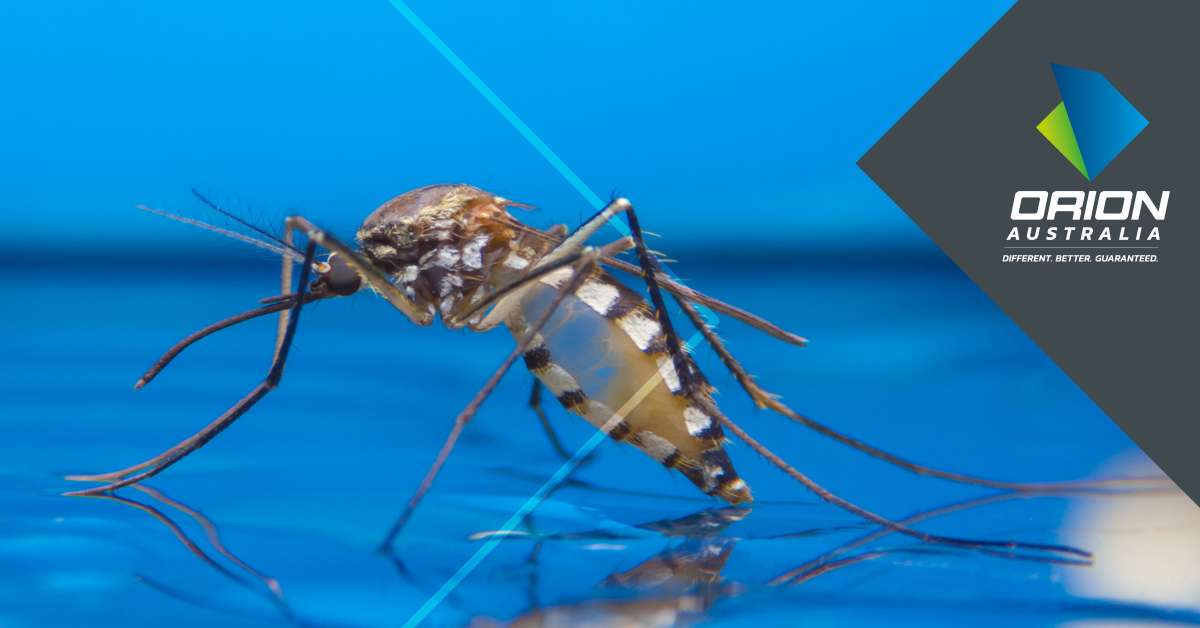22 December 2021
How To Keep Mosquitos Out Of Your Rainwater Tank

Rainwater tanks are magnets for pesky mosquitos as they love ‘standing’ water, especially during the summer months which is their breeding season. If you don’t check your tank regularly for them, and implement the necessary measures to keep them out, you could find them contaminating your rainwater system and swarming your surrounding backyard in no time, as they multiply at lightning speed.
In Australia we have over 300 species of mosquitos, and they are massive pests that can carry and pass on many viruses and diseases (as well as a nasty bite). Rainwater tanks are prime breeding grounds for ‘mozzies’ as they need water to breed. However, mosquitos can lay eggs in as little as 3cm of water, so surrounding elements of your tank system such as gutters and downpipes where pools of water could form, also need to be checked and managed.
Thankfully, there are some simple steps and precautions you can take now to check your tank for mosquitos, and to make sure they don’t breed there this summer.
Steps To Prevent Mosquitos In & Around Your Rainwater Tank This Summer
1. Inspect the body of your tank for damage & gaps.
Any holes, cracks or gaps in your rainwater tank (even the smallest and most seemingly insignificant) are an uninvited entry for mosquitos. This summer, make sure you thoroughly inspect the body of your tank for corrosion (steel tanks), or cracks (plastic tanks) and gaps developing, and fix any damage ASAP. Mosquitos will exploit these gaps and enter to lay eggs. Also of course check inside the tank for mozzies and the join where the lid meets the body of the tank, as over time, this join can possibly warp and develop a gap.
2. Clean out your gutters.
Gutters that are full of decomposing leaves and debris can create pools of stagnant water – an ideal mosquito breeding environment. Leaf matter is also a primary food source for mosquitos. To avoid this, clean out your gutters at least twice a year (especially at the start of summer) to prevent this environment from forming in the first place. The last thing you want is for mosquito eggs to be laid in your gutters then washed down into your rainwater tank. The most effective way to keep your gutters debris-free is to screen them with an over-the-gutter mesh, which should be matched to the size of the leaves in your area. Also, regularly trim and clear overhanging trees from around your gutters.
3. Check your downpipes.
The pipes that channel water from your roof to your rainwater tank also offer a particularly enticing environment for mosquitos. It’s another place where leaves and debris can accumulate, and as mentioned above, this is an ideal breeding nest for mosquitos, who’s eggs could then flow down into your tank. Orion’s Downpipe Water Diverter is the perfect solution for keeping mozzie’s out of your downpipes, and can be installed in each of the downpipes supplying water to your tank. This device prevents debris and insects from entering your tank, helping to improve the water quality inside and protecting your pumps and internal appliances - definitely worth the investment!
4. Employ secure screens/strainers & check them for damage.
When not in use, all access points to your rainwater tank (with the exception of the inlet and any overflows) should be kept tightly shut protected by mosquito-proof mesh screens. Another line of defence you can add is a Poly Tanks, which is essential for straining debris and insects out of the water before it enters your tank. All Orion Poly Tanks and Steel Tanks have leaf strainers and mesh as a standard inclusion. At the start of summer, it’s important to check these strainers/mesh for holes and tears and fix any as soon as possible. All it would take is for one female mosquito to find the gap, wiggle her way in, and lay a million eggs in your beautiful, clean rainwater, soon filling your backyard with swarms of mozzies!
5. Be aware of nearby breeding grounds around your tank.
As mentioned above, mosquitoes don’t need very much water to lay millions of eggs, and other backyard open water sources nearby your tank that may seem insignificant, could also attract mozzies during breeding season. Things like taps/hoses, buckets, bins, and pot plants that all accumulate pools of water in your backyard can also be a mozzie magnet, so make sure they are cleared away from your tank. Also make sure that puddles or pools of water on the ground around your tank from leaks or run-off are dealt with straight away!
What happens if I find mosquitos in my rainwater tank?
If you detect mosquitos in your rainwater tank, the first thing you should do is locate and repair the gaps in which they came in from. In addition to preventing new ones from getting in, you’ll be stopping the adult mozzies getting out and continuing their breeding elsewhere nearby (e.g., your gutters).
Treatment to kill mosquito larvae can be administered to your tank, but you must be VERY careful with what kinds of chemicals you use. Visit the Australian Department of Health website for more information on chemical treatments to kill mosquitos or contact our team today and we can point you in the right direction!


